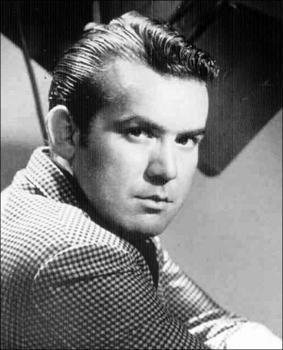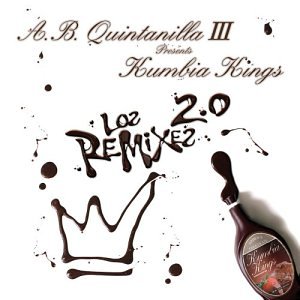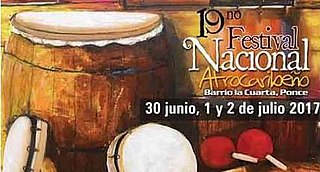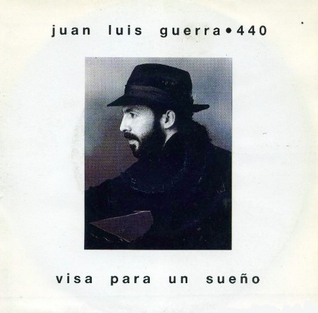Carlos Javier Rivera Massó, better known as Charlie Massó, is a Puerto Rican singer and actor. Massó is a former member of Menudo, joining the band at the height of Menudo's worldwide fame. He replaced Rene Farrait and quickly became a fan favorite with his participation on the albums of Por Amor and Una Aventura Llamada Menudo, which was the name of both Menudo's second movie and of the soundtrack album for it. Charlie recorded 14 albums with Menudo, two were nominated for a Grammy Award for Best Latin Pop Album in 1984 and 85.

The Music of Puerto Rico has evolved as a heterogeneous and dynamic product of diverse cultural resources. The most conspicuous musical sources of Puerto Rico have primarily included African, Taino Indigenous, and European influences. Puerto Rican music culture today comprises a wide and rich variety of genres, ranging from essentially native genres such as bomba, jíbaro, seis, danza, and plena to more recent hybrid genres such as salsa, Latin trap and reggaeton. Broadly conceived, the realm of "Puerto Rican music" should naturally comprise the music culture of the millions of people of Puerto Rican descent who have lived in the United States, especially in New York City. Their music, from salsa to the boleros of Rafael Hernández, cannot be separated from the music culture of Puerto Rico itself.

Santa Isabel is a town and municipality of Puerto Rico located in the southern coast of the island, south of Coamo; east of Juana Díaz; and west of Salinas. Santa Isabel is spread over 7 barrios and Santa Isabel Pueblo. It is the principal city of the Santa Isabel Micropolitan Statistical Area and is part of the Ponce-Yauco-Coamo Combined Statistical Area.

The Puerto Rico national basketball team represents Puerto Rico in men's international basketball competitions, it is governed by the Puerto Rican Basketball Federation, The team represents both FIBA and FIBA Americas.

El Gran Combo de Puerto Rico, commonly known as El Gran Combo, is a Puerto Rican salsa orchestra based in San Juan, Puerto Rico. Celebrating its 50th anniversary in 2012, it was often considered Puerto Rico's most successful musical group. The group received the moniker La Universidad de la Salsa in Colombia, due to the sheer number of famous salsa musicians and singers who developed their careers with it, who started with the group, or who were occasionally backed up by the band and La India.

Giovanni Hidalgo a.k.a. "Mañenguito" is a Latin jazz percussionist.

Milagros del Rosario Quezada Borbón is a Dominican-American singer specializing in Merengue. She is a four-time Latin Grammy Award winner and has been referred to as the "Queen of Merengue" because of her impact on the world of merengue music.

Paquito Cordero, was a pioneer of Puerto Rican television. He was also a comedian and a musical and television producer.
Nino Segarra is a singer, composer, musician and musical arranger.
Cruz Manuel Hernández Santiago, known artistically as Manny Manuel, is a Puerto Rican musician and singer of merengue, bolero, and tropical music. He became famous first as a member of the group Los Sabrosos del Merengue, before launching a successful solo career in 1994.

Los Remixes 2.0 is the second remix album and seventh album by Mexican-American cumbia group A.B. Quintanilla y Los Kumbia Kings and the second remix album by Mexican-American musician A.B. Quintanilla. It was released on April 6, 2004 by EMI Latin. It includes a cover of a song by Menudo, "Sabes a Chocolate". Los Kumbia Kings member Abel Talamántez was himself a member of Menudo before.

Ojalá Que Llueva Café is the fourth studio album by Dominican singer-songwriter Juan Luis Guerra released in 1989 by Karen Records. It is considered one of his most emblematic and important albums. The album set the musical path for his later albums, re-formulating Dominican merengue and bachata music through the contemporary elements of pop, rock, salsa, or jazz. Incorporating socially conscious lyrics with danceable merengues and romantic-poetic bachatas, the album is considered one of the most important albums of his discography.

Fogaraté! is the seventh album of the famous Dominican songwriter and musician Juan Luis Guerra. It was released on July 19, 1994. The album mixed a variety of music genres including rural and flolklroic rots of merengue called "Perico Ripao" with elements of African soukus music and Tropical Music such as Reggae with the collaboration of African guitarist Diblo Dibala and Dominican accordionist Francisco Ulloa, along with Son, Bachata and Salsa. Also, the album features a particular, bachata-styled adaptation of the Lacrimosa movement from Mozart's Requiem Mass in D Minor and Guerra's first song fully in English "July 19". Exploring lyrics and themes about magical realism of Latin American literature and commenting on the politics of the Caribbean, for many fans and critics, Fogaraté! is one of his most musically complex album.

Isabel Freire de Matos was a writer, educator, journalist, and activist for Puerto Rican independence. Freire de Matos was the author of several children's books and the wife of Francisco Matos Paoli, a high-ranking member of the Puerto Rican Nationalist Party.

En Vivo is the first live album and fourth overall album of Latin Grammy winner, singer-songwriter Kany García. The album was released on February 25, 2015. This live album was recorded at the Coliseo de Puerto Rico.

Festival Nacional Afrocaribeño is an annual cultural celebration held at Ángel "Cuqui" Mangual baseball field in the La Cuarta neighborhood of Barrio Capitanejo in Ponce, Puerto Rico. The celebration, which commonly lasts three days, takes place in late June. It has been called "a world-class" event that brings together "the best exponents of salsa, bomba, plena and merengue music". It is attended by some 30,000 people. The festival's purpose is to positively impact the region by creating a cultural space to help preserve traditions. It aims to highlight the contributions to Puerto Rico culture and society by Puerto Ricans of African heritage. The festivities are highlighted by bands playing salsa, bomba and plena music.

This article includes an overview of trends in Latin music in the 1990s, namely in Ibero-America. This includes the rise and fall of various subgenres in Latin music from 1990 to 1999.

Visa Para Un Sueño(English: Visa for a dream) is the third single by Dominican artist Juan Luis Guerra and his band 440 from their fourth studio album Ojalá Que Llueva Café. Initially released by Karen Records in the Dominican Republic in 1989, it was released a year later in Spain. The track is a merengue providing a social commentary about the difficulties of obtaining a United States visa order to find work, better living conditions, and escape the poverty of third world countries, as well as being about the state of mind that many Dominicans have. The track was inspired by the illegal trips many Dominicans take to Puerto Rico every year to find better living and working conditions.













